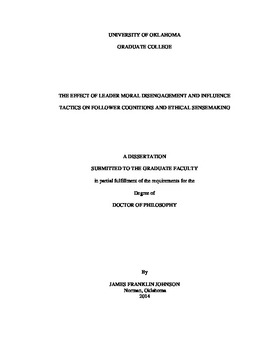| dc.contributor.advisor | Connelly, Shane | |
| dc.contributor.author | Johnson, James | |
| dc.date.accessioned | 2014-12-15T15:01:15Z | |
| dc.date.available | 2014-12-15T15:01:15Z | |
| dc.date.issued | 2014-12 | |
| dc.identifier.uri | https://hdl.handle.net/11244/13886 | |
| dc.description.abstract | During times of organizational crisis followers often rely on their leader’s experience and knowledge to provide ethical guidance. However, crises also provide leaders increased opportunity to influence followers to commit unethical acts. The current study examined how leaders use deliberate strategies like moral disengagement and proactive influence tactics to achieve follower compliance. Using a model of ethical sensemaking, results indicate follower sensemaking processes and behaviors were significantly affected by leader strategies. Overall, a leader’s use of proactive influence tactics significantly impacted follower moral disengagement, forecasting, and ethical decision making. Additionally, leader moral disengagement and specific strategy pairs significantly influenced follower conformity and collusion with their leader to act unethically. Implications regarding theoretical contributions and practical implications are discussed. | en_US |
| dc.language | en_US | en_US |
| dc.subject | Leadership | en_US |
| dc.subject | Followership | en_US |
| dc.subject | Moral Disengagement | en_US |
| dc.subject | Influence Tactics | en_US |
| dc.subject | Ethical Decision Making | en_US |
| dc.subject | Organizational Ethics | en_US |
| dc.title | The effect of leader moral disengagement and influence tactics on follower cognitions and ethical sensemaking | en_US |
| dc.contributor.committeeMember | Mumford, Michael | |
| dc.contributor.committeeMember | Devenport, Lynn | |
| dc.contributor.committeeMember | Song, Hairong | |
| dc.contributor.committeeMember | Buckley, Michael | |
| dc.date.manuscript | 2014 | |
| dc.thesis.degree | Ph.D. | en_US |
| ou.group | College of Arts and Sciences::Department of Psychology | en_US |
| shareok.nativefileaccess | restricted | en_US |
